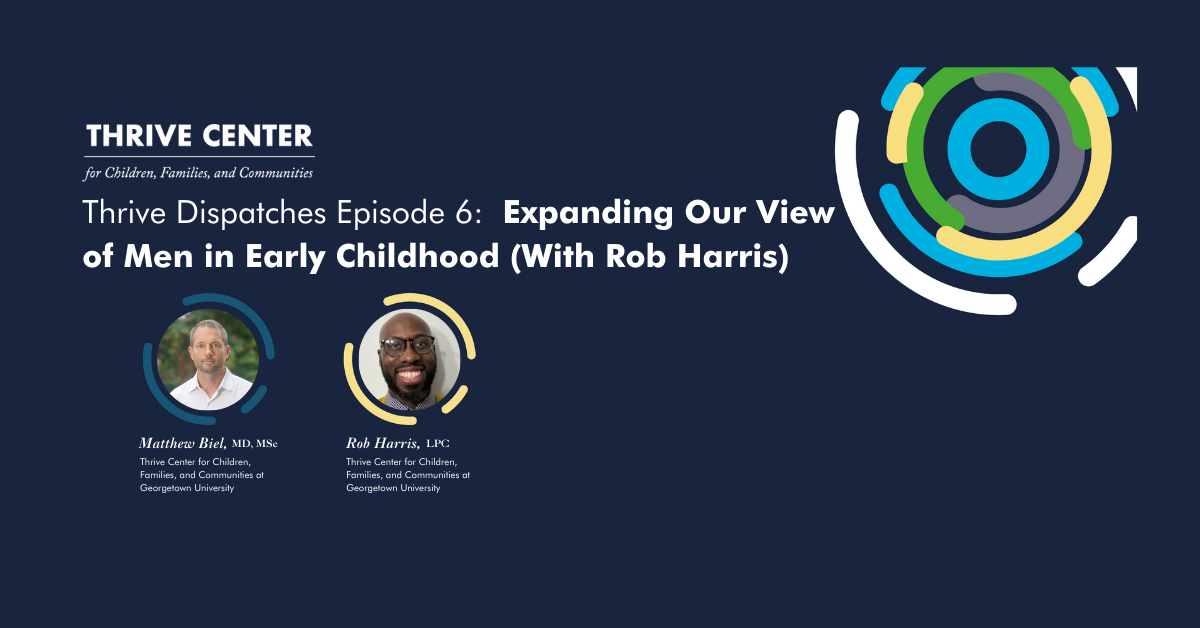Episode 6: Expanding Our View of Men in Early Childhood (With Robert Harris)
This is Episode 6 of Thrive Dispatches, a podcast from the Thrive Center for Children, Families, and Communities at Georgetown University.
In this episode, Dr. Matt Biel speaks with Rob Harris, an expert in early childhood mental health and education. Their conversation explores the critical role of relationships that young children form with the adults in their lives – caregivers, parents, extended family members, and educators.
Rob brings a unique perspective shaped by his experiences as a classroom teacher, mental health counselor, consultant, and father. The discussion challenges conventional thinking about children’s behavior, presenting it as a crucial form of communication about their inner experiences and emotional needs.
Throughout their conversation, Rob helps us understand how supporting young children’s mental health requires us to think holistically about families, to remain curious about behavior even when challenging or confusing, and to create more inclusive spaces for all caregivers who play vital roles in children’s development.
For questions, comments, or ideas for future episodes, please email us at: thrivecenter@georgetown.edu
Summary:
In the following excerpt, Matt and Rob discuss Head Start programs and their impact on families and communities.
Matt: Keeping curiosity and understanding in mind, what do you think people need to understand about Head Start? Give me like a little two-minute tutorial on what is it that people need to understand about Head Start?
Rob: Head Start is the way we should be going about education period. It goes back to a teaching principle, right, for those who have taught, and I’ll say this, if you’re in a classroom, if you teach to your lowest learner, air quote, everyone else can learn.
Right, ’cause you’ve scaled it back in such a way that the person who needs to understand can, and those who may not have needed that support will. That’s what Head Start is to be, right, it’s realizing that, hey, here’s this group of individuals who don’t have the same access or opportunities that are needed.
And so we’re going to wrap them in the services that will support them to give them what they need so that their children can achieve, so that their families can achieve, and as a result, the community can achieve.
And I think, if you think about what Head Start is doing, it just makes sense for every educational model to be the same way. And I think that’s what Head Start is, a one-stop shop for the family and the community.
You go back to that idea to thrive, Head Start wants you to thrive. Hey, mom, oh my gosh, I absolutely know you would do differently for your child in terms of their nutritional health if you knew better. Don’t worry, we have classes for you. And then the moment you provide that education, because it’s not that the parent did not want it, they just didn’t have access to it. And the moment they receive it, you see that parent, and I shouldn’t even just say mother, but that parent, that family is thriving.
And so what Head Start does is making sure families have all they need to thrive. And as a result, you see children children be able to grow.
You hear tons of stories of individuals who said: “If it had not been for Head Start, where would I be?”
Listen to the full episode
- Tagged
- behavior as communication
- caregiving roles
- child development
- child regulation
- community impact
- cultural expectations
- developmental psychology
- early childhood education
- early childhood mental health
- early intervention
- effective communication
- family support
- family systems
- father involvement
- fatherhood
- georgetown university
- Head Start programs
- infant mental health
- male representation
- men in education
- parent-child relationships
- parenting roles
- Rob Harris
- Thrive Center
- thriving communities
